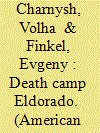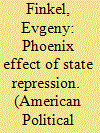| Srl | Item |
| 1 |
ID:
158491


|
|
|
|
|
| Summary/Abstract |
We explore the relationship between capacity for collective action and representation in autocracies with data from Imperial Russia. Our primary empirical exercise relates peasant representation in new institutions of local self-government to the frequency of peasant unrest in the decade prior to reform. To correct for measurement error in the unrest data and other sources of endogeneity, we exploit idiosyncratic variation in two determinants of peasant unrest: the historical incidence of serfdom and religious polarization. We find that peasants were granted less representation in districts with more frequent unrest in preceding years—a relationship consistent with the Acemoglu-Robinson model of political transitions and inconsistent with numerous other theories of institutional change. At the same time, we observe patterns of redistribution in subsequent years that are inconsistent with the commitment mechanism central to the Acemoglu-Robinson model. Building on these results, we discuss possible directions for future theoretical work.
|
|
|
|
|
|
|
|
|
|
|
|
|
|
|
|
| 2 |
ID:
156705


|
|
|
|
|
| Summary/Abstract |
Transfer and redistribution of wealth accompany most violent conflicts throughout the world, yet the local-level political and economic effects of this phenomenon remain unexplored. We address this omission by examining the long-term impact on the surrounding communities of the Nazi death camp Treblinka in Poland, where nearly a million Jews were murdered. The assets of murdered Jews sometimes ended up in the hands of the local population. We are able to identify the enduring impact of these property transfers on local economic and political outcomes because the exact location of Treblinka was exogenous to the characteristics of surrounding communities. We find that communities located closer to the camp experienced a real estate boom but do not exhibit higher levels of economic and social development. These communities also showed higher support for an anti-Semitic party, the League of Polish Families. Our findings speak to an important but overlooked challenge to post-conflict reconstruction and reconciliation.
|
|
|
|
|
|
|
|
|
|
|
|
|
|
|
|
| 3 |
ID:
140176


|
|
|
|
|
| Summary/Abstract |
Why are some nascent groups able to organize sustained violent resistance to state repression, whereas others quickly fail? This article links the sustainability of armed resistance to a largely understudied variable—the skills to mount such a resistance. It also argues that the nature of repression experienced by a community creates and shapes these crucial skills. More specifically, the article focuses on a distinction between selective and indiscriminate state repression. Selective repression is more likely to create skilled resisters; indiscriminate repression substantially less so. Thus, large-scale repression that begins at time t has a higher chance of being met with sustained organized resistance at t +1 if among the targeted population there are people who were subject to selective repression at t‒1. The article tests this argument by comparing the trajectories of anti-Nazi Jewish resistance groups in three ghettos during the Holocaust: Minsk, Kraków, and Białystok.
|
|
|
|
|
|
|
|
|
|
|
|
|
|
|
|